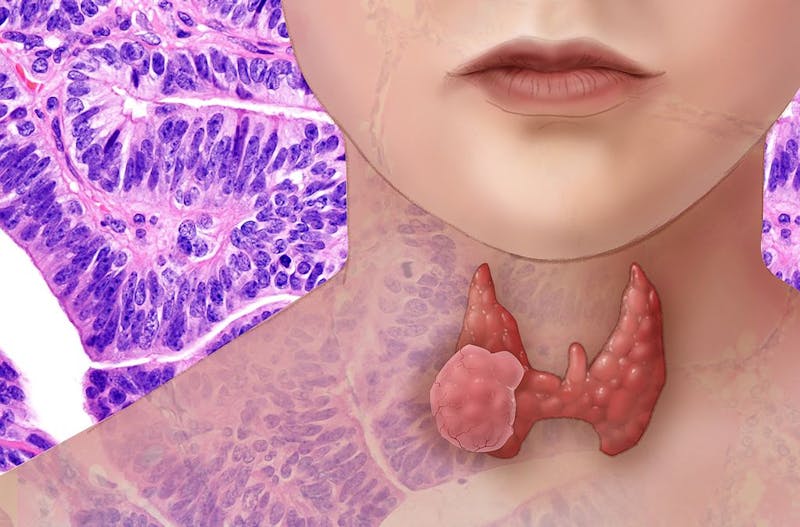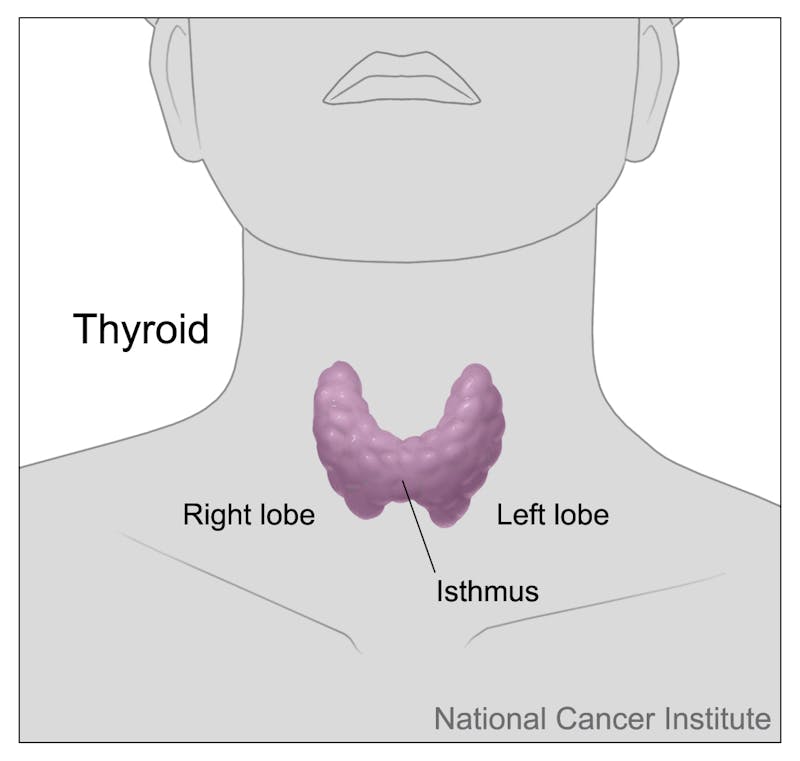Thyroid cancer
Thyroid cancer is a type of cancer that affects the thyroid gland and occurs when cells of thyroid gland grow in an abnormal way and further appears as small lumps or nodules within the thyroid gland. It is a rare type of cancer and does not spread quickly. Women are more likely to develop thyroid cancer than men. It has a very high cure rate. If left untreated, cancer can grow and spread to the other parts of the body.

What is Thyroid Gland?
The Thyroid gland is a small butterfly shaped gland located in front of the neck just below the larynx (voice box). It has two lobes, which lie on either side of the windpipe. The lobes are connected by a thin strip called the isthmus. Being a part of the endocrine system, thyroid gland releases 3 separate hormones in the bloodstream: * T4, * T3 and * Calcitonin.
These hormones control the metabolism, heart rate and temperature. Thyroid gland absorbs iodine from the bloodstream to produce Thyroxine (T4) and Triiodothyronine (T3). However, the production of T3 and T4 is not possible without the stimulation of TSH. Hypothalamus, part of the brain, signals the pituitary gland to produce a hormone called Thyroid stimulating hormone (TSH). It is TSH that controls the secretion of T3 and T4. The type of cells present in thyroid gland are:
Follicular cells: Follicular cells help control functions such as body temperature, heart rate. These use iodine from the blood to make hormones.
Parafollicular cells (C cells): Parafollicular cells produce Calcitonin, a hormone that helps in controlling the level of calcium in blood.

Types of thyroid cancer
There are 4 main types of thyroid cancer:
Papillary thyroid cancer
This is the most common type of thyroid cancer and is usually found in one lobe. It develops from the follicular cells. These cancers tend to grow slowly and often spread to the lymph nodes. It usually affects people under the age of 40, mostly women. Even though they spread to the lymph nodes, they can be treated successfully and are rarely fatal. This type of cancer is treated with thyroid surgery and in some cases with radioactive iodine.
Follicular thyroid cancer
This is the second most common type of thyroid cancer. Like papillary thyroid cancer, it grows slowly and develops from the follicular cells. It stays in the thyroid gland, but sometimes it spreads to the other parts of body like lungs or the bones. It does not spread to lymph nodes. The treatment of follicular thyroid cancer is similar to papillary thyroid cancer. Medullary Cancer-Medullary Cancer develops from the parafollicular cells (C-cells). They release high level of Calcitonin, a hormone that helps control the amount of calcium in blood.
Anaplastic Cancer
This type of cancer is rare. It may develop from papillary or follicular thyroid cancer. It is a very aggressive form that grows and spreads quickly to the neck and other parts of the body. It usually occurs in older people and is more common in women.
What causes thyroid cancer?
The exact cause of thyroid cancer is unknown. However, radiation is one of the most common causes. People who have been exposed to lots of radiation are at higher risk. Risk factors- The risk factors include:
- Age: It can occur at any age. However, the most common age group is 25-65
- Gender: Women are 2-3 times more likely to develop thyroid cancer than men.
- Radiation therapy : Radiation increases the risk of developing thyroid cancer.
- Iodine deficiency
- Family history of thyroid cancer
- Acromegaly
- Weight and height: Greater height and BMI (Body Mass Index) have been associated with thyroid cancer in men.
Symptoms
The symptoms of thyroid cancer depend on the type. In early stages, thyroid cancer may cause no symptoms. It may appear when the disease is more advanced. The most common symptom of thyroid cancer is the development of painless lump or swelling in the throat. Other symptoms may include: * Unexplained hoarseness * Sore throat * Pain in the neck * Difficulty breathing and swallowing
Diagnosis
Your healthcare provider may perform a variety of tests, including: * Blood test: It is done to ensure if the thyroid gland is working properly. It measures the hormone level in the blood. * Fine Needle Aspiration Cytology (FNAC): In FNAC, a thin needle is inserted into the lump, and cells are taken out for examination. This specimen is then looked under a microscope to see whether it contains cancer cells or not. * Ultrasound: It is usually done to check if the lymph nodes are affected. * CT scan of neck
Treatment
Treatment plan for thyroid cancer depends on the type and grade of the cancer. Treatment is effective if diagnosed easily. Treatment options available are:
Surgery
Surgery is the most common type of treatment. It involves the removal of a part or the entire thyroid. Common surgical procedures include * Lobectomy: Lobectomy is a surgery in which only one of the two lobes is removed. It is recommended when the thyroid cancer is very small. It is also called as partial thyroidectomy, or hemi-thyroidectomy. * Near-total thyroidectomy: Near total or subtotal thyroidectomy is the removal of nearly all or most of the thyroid gland. The patients who undergo this type of surgery need to be on lifelong thyroid hormone replacement after surgery. * Total thyroidectomy: It is the most common type of surgery done for thyroid cancer. This procedure involves the removal of the entire thyroid gland, including the isthmus.
Radiation iodine treatment
Radioactive iodine given by mouth kills the cancer cells and reduces the risk of cancer returning. It is often recommended after surgery.
Chemotherapy
This involves the use of drugs to kill or slow the growth of cancer cells. The drugs are given intravenously or as tablets. Chemotherapy drugs may be given depending on the type of cancer and where it is found.
Hormone therapy
After thyroid removal surgery, your body may no longer produce thyroid hormone. So, patients must take hormone pills for the rest of their lives. This prevents the cancer from coming back.
DISCLAIMER
This web page provides general information and discussions about health, medicine and related subjects. The information and other content provided on this website, or in any linked materials, are not intended and should not be construed as medical advice, nor is the information a substitute for professional medical expertise or treatment.
The content is for information purpose only and is not a medical advice. Qualified doctors have gathered information from reputable sources; however Credence Medicure Corporation is not responsible for errors or omissions in reporting or explanations. No individual should use the information, resources and tools contained herein to self diagnose or self treat any medical condition.
If you or any other person has a medical concern, you should consult with your health care provider or seek other professional medical treatment. Never disregard professional medical advice or delay in seeking it because of something that have read on this blog or in any linked materials. If you think you may have a medical emergency, call your doctor or emergency services immediately.
The opinions and views expressed on this blog and website have no relation to those of any academic, hospital, health practice or other institution. Credence Medicure Corporation gives no assurance or warranty regarding the accuracy, timeliness or applicability of the content.
